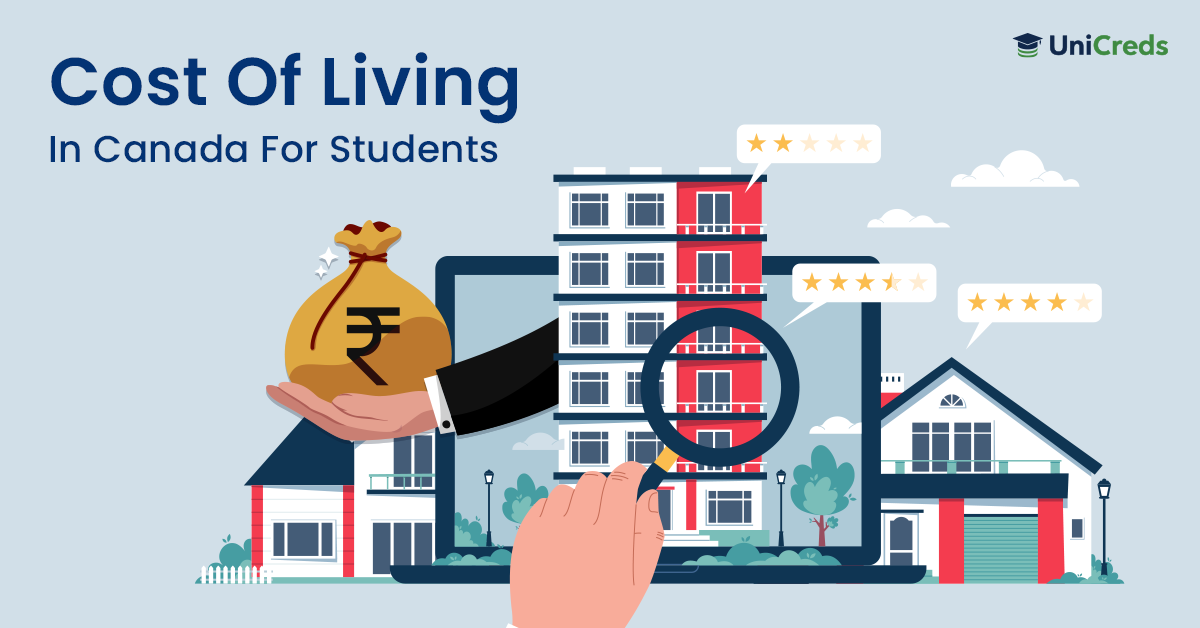Table of Contents
Studying in Canada is an exciting journey, but it also comes with financial considerations. Before you make the move, it’s essential to understand how much you’ll need to cover your expenses.
In 2025, the cost of living for students in Canada ranges between CAD 15,000 and CAD 20,000 (approximately INR 9.03 lakh to INR 12.05 lakh) per year.
This includes accommodation, food, transportation, and other essentials. While the cost may seem high, there are ways to manage your budget effectively and make student life in Canada more affordable.
Why Study in Canada?
Canada is one of the most sought-after destinations for international students due to its high-quality education, diverse culture, and welcoming environment.
The country is home to some of the world’s top universities and offers post-study work opportunities, making it an excellent investment for your future.
Additionally, Canada is known for its safety, multicultural society, and breathtaking natural landscapes, providing an enriching experience beyond academics.
Cost of Accommodation in Canada
Your biggest expense will likely be housing. The accommodation cost in Canada in 2025 varies depending on whether you live on-campus or off-campus.
Here’s what you can expect to pay:
| Accommodation Type | Average Cost |
| On-campus housing | CAD 8,000- CAD 10,000 per year |
| Shared off-campus living | CAD 400- CAD 700 per month |
| A one-bedroom flat in the city centre | CAD 1,800- CAD 1,900 per month |
| One-bedroom flat outside the city centre | CAD 1,600- CAD 1,700 per month |
| Three-bedroom apartment in downtown | CAD 3,000- CAD 3,100 per month |
| Three-bedroom apartment in suburban areas | CAD 2,500- CAD 2,600 per month |
If you’re looking to save money, shared accommodations are the best option. Renting a place with roommates can significantly reduce your monthly rent and utility costs.
On-campus housing is also a convenient option as it includes utilities and is close to your university.
Your Study Abroad Journey Starts Here!
Get your education loan approved in just 48 hours* with expert assistance.
Cost of Education in Canada
Studying in Canada involves varying tuition costs depending on the course level. Undergraduate programs range from CAD 15,500 to 54,000 annually, reflecting diverse fields and institutions.
Postgraduate studies typically cost between CAD 13,500 and 46,000 per year.
MBA programs, known for their intensive nature, average CAD 33,000 to 35,000 annually.
PhD courses present a more accessible range, from CAD 6,000 to 15,500 per year. It is crucial to note that these figures are approximate and that the precise costs will vary between individual universities and also between different programs of study.
Cost of Food and Restaurants in Canada

Your food expenses will depend on whether you cook at home or eat out frequently. Dining out can be expensive, so cooking your own meals will help you stay within budget.
Here’s what you might spend on food:
| Item | Average Cost (CAD) |
| Meal at a Budget-Friendly Restaurant | CAD 20 – CAD 30 |
| Dinner for Two at a Mid-range Eatery (Three-course) | CAD 100 – CAD 150 |
| Fast Food Combo (McDonald’s or Similar) | CAD 15 – CAD 25 |
If you prefer to cook at home, grocery expenses will range from CAD 200 to CAD 400 per month, depending on your eating habits and where you shop.
Buying in bulk and shopping at discount supermarkets can help lower costs.
Cost of Transportation in Canada

Transportation costs vary depending on the city you live in. Many Canadian cities have excellent public transport networks, making it easy to get around without a car.
Here’s what you can expect to pay:
| Transportation Type | Average Cost |
| Single Ride on Local Transport | CAD 3 – CAD 4.25 |
| Monthly Transit Pass | CAD 100 – CAD 110 |
| Taxi Base Fare | CAD 4 – CAD 5 |
If you plan on using public transport frequently, investing in a monthly pass will save you money.
Some universities also offer discounted transit passes for students.
Your Study Abroad Journey Starts Here!
Get your Abroad Education Loan approved in just 48 hours* with UniCreds.
City-Wise Cost of Public Transport in Canada
Here’s a breakdown of typical public transportation costs in major Canadian cities, showcasing the variation in single and multiple fare options:
| City | Single Fair | Multiple Fair |
| Vancouver (TransLink) | (Depends on Zone) Starts at CAD 3.00-CAD 4.00 | (1-Zone) CAD 100.90- CAD 105.00 |
| Calgary (Calgary Transit) | CAD 3.00-CAD 4.00 | CAD 110.00-CAD 115.00 |
| Montreal (STM) | CAD 3.50-CAD 4.25 | CAD 95.00-CAD 100.00 |
| Edmonton (Edmonton Transit) | CAD 3.00-CAD 4.00 | CAD 90.00-CAD 110.00 |
| Toronto (TTC) | CAD 3.00-CAD 4.25 | CAD 150.00-CAD 160.00 |
Other Essential Expenses
Apart from rent, food, and transport, you’ll need to budget for other expenses like:
- Health Insurance: Mandatory for international students; costs vary by province.
- Internet and Mobile Plans: Around CAD 50 – CAD 100 per month.
- Books and Study Materials: CAD 500 – CAD 1,000 per year.
- Entertainment and Leisure: CAD 100 – CAD 300 per month, depending on your lifestyle.
Ways to Reduce the Cost of Living in Canada

While the cost of living in Canada may seem high, there are several ways to manage your expenses:
1. Opt for Shared Housing – Sharing an apartment with roommates significantly cuts rent and utility costs.
2. Prepare Your Own Meals – Eating out regularly adds up quickly. Cooking at home is healthier and more budget-friendly.
3. Take Advantage of Student Discounts – Many places offer transportation, restaurants, and entertainment reductions for students.
4. Buy Second-Hand Textbooks – University bookstores and online marketplaces have used books at a fraction of the price.
5. Use Public Transport – A student monthly pass is much more affordable than taxis or owning a car.
6. Take Up Part-Time Work – As an international student, you can work up to 20 hours per week during semesters and full-time during holidays to support your expenses.
Conclusion
Studying in Canada requires careful financial planning, but you can manage your expenses effectively with the right approach.
You can make the most of your time in Canada without overspending by choosing affordable housing, cooking at home, and taking advantage of student discounts.
Budgeting wisely will not only help you stay financially stable but also allow you to enjoy your student life to the fullest.
FAQs
1. What is the minimum amount needed for a student to live in Canada?
You’ll need at least CAD 15,000 per year to cover essentials like rent, food, transportation, and utilities. However, expenses vary depending on the city, lifestyle, and type of accommodation. Larger cities like Toronto and Vancouver are significantly costlier.
2. Is Canada an affordable country for international students?
Canada is relatively affordable compared to other major study destinations like the U.S. and the U.K. However, cities like Toronto and Vancouver have a high cost of living, while smaller cities and university towns offer budget-friendly housing, food, and transport options.
3. How can I reduce my expenses while studying in Canada?
To cut down the costs of studying in Canada, consider living with roommates to share rent, cooking meals at home instead of dining out, and using student discounts on transport and entertainment.
4. Can I work while studying in Canada?
Yes, international students can work up to 20 hours per week during academic terms and full-time during scheduled breaks. This helps cover living expenses, gain work experience, and manage finances better, especially in high-cost cities like Toronto or Vancouver.
5. Is it more affordable to live on-campus or off-campus in Canada?
On-campus housing offers convenience but is often more expensive than renting off-campus. Many students choose shared apartments or homestays to save money. Off-campus options provide flexibility in rent, groceries, and utilities, making it a more budget-friendly choice.










0 Comments